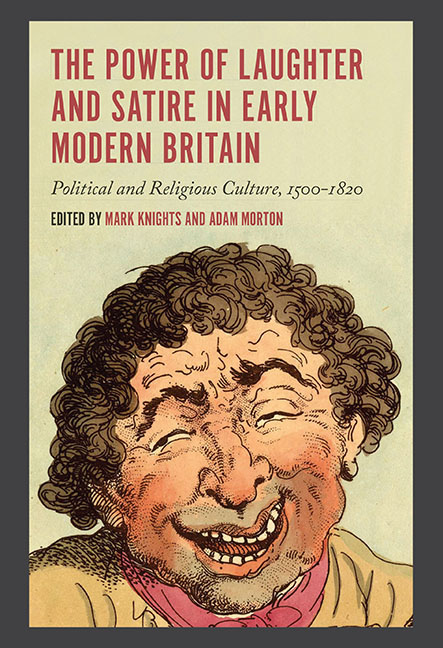Book contents
- Frontmatter
- Contents
- List of Illustrations
- List of Contributors
- Acknowledgements
- List of Abbreviations
- Introduction: Laughter and Satire in Early Modern Britain 1500–1800
- 1 Dissolving into Laughter: Anti-Monastic Satire in the Reign of Henry VIII
- 2 Mocking or Mirthful? Laughter in Early Modern Dialogue
- 3 Farting in the House of Commons: Popular Humour and Political Discourse in Early Modern England
- 4 Continuing Civil War by Other Means: Loyalist Mockery of the Interregnum Church
- 5 Laughter as a Polemical Act in Late Seventeenth-Century England
- 6 Spectacular Opposition: Suppression, Deflection and the Performance of Contempt in John Gay's Beggar's Opera and Polly
- 7 ‘Laughing a Folly out of Countenance’: Laughter and the Limits of Reform in Eighteenth-Century Satire
- 8 Nervous Laughter and the Invasion of Britain 1797–1805
- 9 ‘Was a laugh treason?’ Corruption, Satire, Parody and the Press in Early Modern Britain
- Bibliography
- Index
5 - Laughter as a Polemical Act in Late Seventeenth-Century England
Published online by Cambridge University Press: 01 September 2018
- Frontmatter
- Contents
- List of Illustrations
- List of Contributors
- Acknowledgements
- List of Abbreviations
- Introduction: Laughter and Satire in Early Modern Britain 1500–1800
- 1 Dissolving into Laughter: Anti-Monastic Satire in the Reign of Henry VIII
- 2 Mocking or Mirthful? Laughter in Early Modern Dialogue
- 3 Farting in the House of Commons: Popular Humour and Political Discourse in Early Modern England
- 4 Continuing Civil War by Other Means: Loyalist Mockery of the Interregnum Church
- 5 Laughter as a Polemical Act in Late Seventeenth-Century England
- 6 Spectacular Opposition: Suppression, Deflection and the Performance of Contempt in John Gay's Beggar's Opera and Polly
- 7 ‘Laughing a Folly out of Countenance’: Laughter and the Limits of Reform in Eighteenth-Century Satire
- 8 Nervous Laughter and the Invasion of Britain 1797–1805
- 9 ‘Was a laugh treason?’ Corruption, Satire, Parody and the Press in Early Modern Britain
- Bibliography
- Index
Summary
For early modern people, laughter was capable of altering the world around it: it was a vigorous means of doing. It could bind or corrode. In charivari and other punitive rituals that shamed moral transgressors – cuckolds, shrewish women, adulterers – laughter policed social mores and restored cultural norms by theatrically chastising those who broke them; conversely, in taunting rhymes and mock trials it eroded ties of respect that legitimised authority. Laughter variously mocked and punished, united groups and reaffirmed boundaries, in a range of contexts. Its potency to do was ever-present. Such potency renders laughter's ethical status troubling, either because it was intended to offend, or because it has become offensive over time: consider the persistent mockery of rape victims and the disabled in jest-books; or the lack of sympathy we often feel with satirists who lash their subjects. Early modern laughter can make us deeply uncomfortable. Early modern satire also has many undesirable characteristics: a dense barrage of scorn that co-joined author and audience in an act of violence against its object, it is consequently capable of making modern readers squeamish. That squeamishness is a reaction to laughter's expression of superiority, a deliberate exaggeration of a perceived difference that objectifies or ‘others’ someone/ thing to create and sustain ‘structures of exaltation or abjection’, which empower one social group at the expense of another. The superiority theory has triggered equivalent condemnations in sociology, psychology, phenomenology and psychoanalysis. For Theodor Adorno, for example, laughter is unethical because it is illogical – he ‘who has laughter on his side’, Adorno warned, ‘has no need of proof’. Many critics doubt that laughter can ever be an ethical act.
The argument below is twofold. First, that the problematic aspects of satirical laughter – its corrosive energies of negation – were often central to its polemical appeal and effect. The agency to damage made laughter a precarious weapon, opening those who used it to charges of sedition. Both labels – satire and sedition – accorded laughter political impetus. Disagreements centred upon the morality of laughing in a specific context, not on the force of the laughter (which both labels characterised as considerable).
- Type
- Chapter
- Information
- The Power of Laughter and Satire in Early Modern BritainPolitical and Religious Culture, 1500-1820, pp. 107 - 132Publisher: Boydell & BrewerPrint publication year: 2017
- 1
- Cited by

